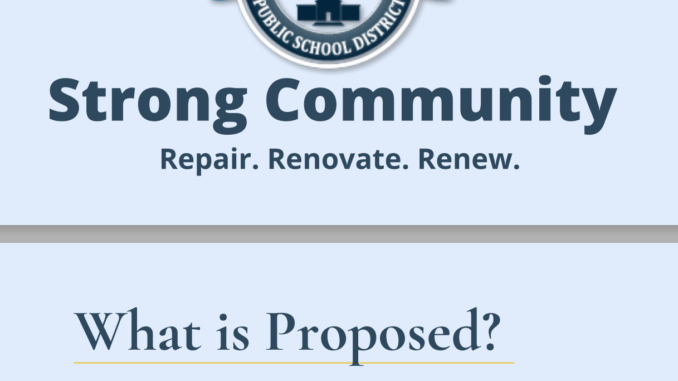
RIVER VALE, N.J.—The River Vale Public School Board of Education is hosting an online forum for voters to hear from architects, financial advisers and school staff—and each other—on the district’s $35.7 million facilities referendum, which is set for April 20.
The hearing is set for April 6 at 7 p.m. A link will be posted on the district board’s website at rivervaleschools.com/vote.
Three questions focus on upgrading facilities at Roberge and Woodside elementary schools and Holdrum Middle School, overall including air conditioning, new roofs, new wellness centers, new outdoor learning areas, and redesigns and new entryways.
District reserves and state aid are eyed to reduce taxpayers’ burden. A board web portal describes each question, what it plans to do with the money, and how the borrowing will affect taxpayers.
This is the first such referendum in the district in 20 years; that debt retires this year.
District interim Superintendent Frank Alvarez said in February outreach that the district’s “journey toward a referendum began in June 2019, when a physical needs study helped identify the district’s most critical building needs.”
He said, “A year and a half later, as we continue to deal with a pandemic, those needs haven’t gone away. In fact, some needs have become more pressing, such as the improved filtration that comprehensive air conditioning would provide, and addressing student anxiety that our teachers named as their top concern.”
The district’s referendum website expands on the rationale for the investment, in bold letters promising it’s “ready to repair, renovate and renew.”
“For many of us, this past year has vividly illustrated the importance of being prepared. But even before the pandemic, River Vale Public Schools began an extensive evaluation of the district’s needs, which ultimately led the Board of Education to propose the district’s first bond referendum in 20 years,” it said.
“The April 20 vote involves improvements that would shape student experiences and address building needs for decades to come,” it adds.
The district says state aid would reduce the local cost of those improvements by nearly one-third. Additionally, the Board of Education will use funds in reserve, like a saving account, to reduce the impact. The projects, which will be grouped into three questions on the ballot, would have a wide-ranging and tangible impact at each of the district’s three schools,” notes the home page.
On the referendum, public question #1 asks permission to borrow slightly over $25 million for projects addressing each of three schools’ physical needs, including new roofs;
Question 2 asks to borrow over $9 million for new air conditioning;
Question 3 asks to borrow slightly over $1.7 million.
Officials said if voters defeat question 1, neither 2 nor 3 could pass independently. However, if voters approve question 1, either 2 or 3 could pass or fail independently on its own.
Since 2000, voters have been paying about $230 per year on a previous bond for schools, and will continue through 2021, when that debt ends in 2021.
If question 1 passes, that would add $34 per year for the average homeowner for building improvements; if question 2 passes, that would add about $89 per year for air conditioning upgrades; and if question 3 passes, that would add $25 per year for elementary school wellness centers. That would total about $148 per year, or $13 per month, said officials.
“The River Vale community has a history with the issue of climate control for its schools. In 2000, the Board of Education held a bond referendum for multiple projects including air conditioning. It failed, and the inclusion of air conditioning was considered to be a dividing point.
“A second referendum was held later that year, with AC as a separate question; the main proposal passed but voters still said no to A/C,” states the referendum website.
“Now, two decades later, air conditioning remains a top request for many parents. The school year runs to late June, but warm weather starts in early spring and lasts through mid-fall. More students struggle to acclimate from their cooled homes to their warm and humid classrooms, and that impacts academic focus.”
“Rising rates of allergies and asthma have kept climate control on people’s minds, and most recently the pandemic has heightened interest in air filtration and fresh air exchange. The Board of Education is proposing comprehensive climate control again, giving voters the opportunity to consider the question on its own merits,” states the district’s referendum website.
The district’s pro-referendum website notes that the future 249 units proposed for the “Fairways at Edgewood” townhome development on Rivervale Road and Piermont Avenue were not factored into the tax impact needed for the school bonds.
Until the units are built and assessed, officials note, their tax impacts cannot be known, but “they will provide a new stream of property tax revenue, which spreads the costs a little more for everyone in the community.”
The referendum website notes school enrollment has fallen by 300 students over 15 years, leaving enough room for new students.
A board graphic breaks down key expenditures for specific categories, including $9 million for new construction; $9 million for new air conditioning systems; $8.1 million for interior upgrades; $7.7 million for roofing; $6.4 million for HVAC systems; $1.2 million for flooring; $900K for doors and windows; and $200K for masonry
